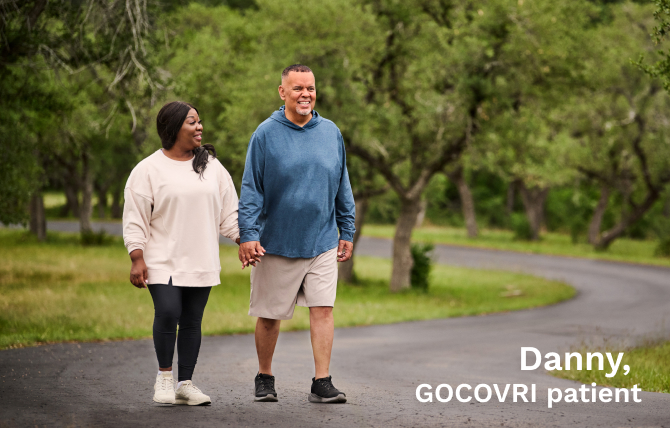IMPORTANT SAFETY INFORMATION AND USES
DO NOT take GOCOVRI if you have severe kidney problems.
Before you take GOCOVRI, tell your doctor about all your medical conditions, including if you:
• have kidney problems
• have a sleep disorder or daytime sleepiness that includes unexpected or unpredictable sleepiness or falling asleep or take medications to help you sleep or that make you drowsy
• drink alcohol. This may increase your chances of becoming drowsy or sleepy while taking GOCOVRI
• are experiencing mental health challenges, such as suicidal thoughts, depression, or hallucinations
• have unusual urges including gambling, increased sex drive, compulsive eating or shopping
• are pregnant or plan to become pregnant or are breastfeeding or plan to breastfeed. GOCOVRI may harm your unborn baby and can pass into your breastmilk
Tell your doctor about all the medicines you take, including prescription and over-the-counter medicines, vitamins, and herbal supplements.
Especially tell your doctor if you take medicines like sodium bicarbonate or have had or are planning to have a live flu (influenza) vaccination (nasal spray). You can receive the influenza vaccination shot but should not get a live influenza vaccine while taking GOCOVRI.
While taking GOCOVRI:
-
Do not stop or change the dose of GOCOVRI before talking with
your doctor. Call your healthcare provider if you have symptoms of withdrawal
such as fever, confusion, or severe muscle stiffness.
-
If you took too much GOCOVRI, call your doctor or go to the nearest hospital emergency room right away.
What should I avoid while taking GOCOVRI?
-
Do not drive, operate machinery, or do other dangerous activities until you know how GOCOVRI affects you.
-
Do not drink alcohol while taking GOCOVRI as it can increase your chances of serious side effects.
What are the possible side effects of GOCOVRI?
GOCOVRI may cause serious side effects, including:
-
Falling asleep during normal activities. You may fall asleep without being drowsy or without warning during activities such as driving, talking, or eating. This may result in having accidents. Your chances of this while taking GOCOVRI are greater if you take other medicines that cause drowsiness. Tell your doctor right away if this happens.
-
Suicidal thoughts or actions and depression. Tell your doctor if you have new or sudden changes in mood, behaviors, thoughts, or feelings, including thoughts about hurting yourself or ending your life.
-
Hallucinations. GOCOVRI can cause or worsen hallucinations (seeing or hearing things that are not real) or psychotic behavior. Hallucinations can be a serious and common side effect of GOCOVRI. Contact your doctor if you have hallucinations.
-
Feeling dizzy, faint or lightheaded, especially when you stand up
(orthostatic hypotension). Lightheadedness or fainting may happen when getting up too quickly especially after long periods of time, when first starting GOCOVRI, or if your dose has been increased. These side effects are serious and common for GOCOVRI. Contact your doctor if you experience these.
-
Blurred vision, eye pain, vision loss. Tell your healthcare provider if you experience changes to your vision.
-
Unusual urges. Examples include gambling, increased sexual urges, strong urges to spend money, binge eating, and the inability to control them. If you notice or your family notices that you are developing any unusual behaviors, talk to your doctor.
The most common side effects of GOCOVRI include hallucinations, dizziness, dry mouth, swelling of legs and feet, constipation, a drop in blood pressure when standing, and falls.
These are not all the possible side effects of GOCOVRI.
You are encouraged to report negative side effects of prescription drugs to the FDA. Visit www.fda.gov/medwatch, or call 1-800-FDA-1088.
WHAT IS GOCOVRI®?
GOCOVRI® (amantadine) extended-release capsules is a prescription medicine used:
-
for the treatment of dyskinesia (sudden uncontrolled movements) in people
with Parkinson's disease who are treated with levodopa therapy or levodopa
therapy with other medicines that increase the effects of dopamine in the
brain.
-
with levodopa and carbidopa in people with Parkinson's disease who are
having “off” episodes.
It is not known if GOCOVRI is safe and effective in children.
Please see Patient Information.


 gocovri.com
gocovri.com


